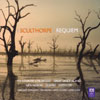Sculthorpe Requiem
The heartfelt new Requiem is the crowning glory of this Sculthorpe set
View record and artist detailsRecord and Artist Details
Composer or Director: Peter Sculthorpe, William Barton
Genre:
Vocal
Label: ABC Classics
Magazine Review Date: 7/2007
Media Format: CD or Download
Media Runtime: 115
Mastering:
Stereo
DDD
Catalogue Number: ABC4765692

Tracks:
| Composition | Artist Credit |
|---|---|
| Requiem |
Peter Sculthorpe, Composer
Adelaide Chamber Singers Adelaide Symphony Orchestra Arvo Volmer, Conductor Peter Sculthorpe, Composer William Barton, Composer |
| My Country Childhood |
Peter Sculthorpe, Composer
Adelaide Symphony Orchestra James Judd, Conductor Peter Sculthorpe, Composer |
| Earth Cry |
Peter Sculthorpe, Composer
Adelaide Symphony Orchestra James Judd, Conductor Peter Sculthorpe, Composer |
| Great Sandy Island |
Peter Sculthorpe, Composer
Adelaide Symphony Orchestra James Judd, Conductor Peter Sculthorpe, Composer |
| New Norcia |
Peter Sculthorpe, Composer
Adelaide Symphony Orchestra James Judd, Conductor Peter Sculthorpe, Composer |
| Quamby |
Peter Sculthorpe, Composer
Adelaide Symphony Orchestra James Judd, Conductor Peter Sculthorpe, Composer |
Author: Ivan Moody
The eagerly awaited Sculthorpe Requiem brings a further jewel to a wide audience, his first major choral work fascinatingly showing how his unique idiom translates into a traditional mould. The work is dedicated to the memory of his parents but has wider spiritual and ecological concerns, as Graeme Skinner’s notes tell us.
One would know at any given moment that it was Sculthorpe, not only because of the didjeridoo but because his unmistakable harmonic procedures (with which the Adelaide SO under Volmer are entirely at home), carry over into the choral material, with the unexpected spectral gloss of the English cathedral tradition – I found myself thinking momentarily of Britten, Walton or Leighton. This synthesis – of the inheritance of Sculthorpe’s studies in England with his own broad “landscape” style, quoting aboriginal music and employing his “seagull” glissandi – seems entirely right. It is imposing and confrontational but its chief characteristic is a plea for peace and justice. Carl Crossin’s Adelaide Chamber Singers clearly understand the idiom and love the music, to which their full, fresh tone and blend are ideally suited.
The second disc contains orchestral works and new arrangements (under the direction of James Judd). The most significant are the shortened version of Earth Cry from 1999, Great Sandy Island (1998) and Quamby (2000), arranged from the String Quartet No 14 (1998). In the first, the composer wished to come closer to his original joyous vision than his 1986 score did. It’s a kind of satellite, therefore, but an important one (perhaps even a moon hovering around the planetary complex that is the original work) – it’s extraordinary how the work takes off in such a fantastically different, opposite fashion.
The five-movement Great Sandy Island is an enormously powerful combination of landscape and history (at one point it was intended to become an opera), while Quamby, a landscape reflecting colonial oppression, for two flutes, two horns and strings, is the perfect pendant for the Requiem. The Adelaide SO turns in performances brimful of power and beauty and the recorded sound is first-class. An essential release from one of the world’s greatest living composers.
One would know at any given moment that it was Sculthorpe, not only because of the didjeridoo but because his unmistakable harmonic procedures (with which the Adelaide SO under Volmer are entirely at home), carry over into the choral material, with the unexpected spectral gloss of the English cathedral tradition – I found myself thinking momentarily of Britten, Walton or Leighton. This synthesis – of the inheritance of Sculthorpe’s studies in England with his own broad “landscape” style, quoting aboriginal music and employing his “seagull” glissandi – seems entirely right. It is imposing and confrontational but its chief characteristic is a plea for peace and justice. Carl Crossin’s Adelaide Chamber Singers clearly understand the idiom and love the music, to which their full, fresh tone and blend are ideally suited.
The second disc contains orchestral works and new arrangements (under the direction of James Judd). The most significant are the shortened version of Earth Cry from 1999, Great Sandy Island (1998) and Quamby (2000), arranged from the String Quartet No 14 (1998). In the first, the composer wished to come closer to his original joyous vision than his 1986 score did. It’s a kind of satellite, therefore, but an important one (perhaps even a moon hovering around the planetary complex that is the original work) – it’s extraordinary how the work takes off in such a fantastically different, opposite fashion.
The five-movement Great Sandy Island is an enormously powerful combination of landscape and history (at one point it was intended to become an opera), while Quamby, a landscape reflecting colonial oppression, for two flutes, two horns and strings, is the perfect pendant for the Requiem. The Adelaide SO turns in performances brimful of power and beauty and the recorded sound is first-class. An essential release from one of the world’s greatest living composers.
Discover the world's largest classical music catalogue with Presto Music.

Gramophone Digital Club
- Digital Edition
- Digital Archive
- Reviews Database
- Full website access
From £8.75 / month
Subscribe
Gramophone Full Club
- Print Edition
- Digital Edition
- Digital Archive
- Reviews Database
- Full website access
From £11.00 / month
Subscribe
If you are a library, university or other organisation that would be interested in an institutional subscription to Gramophone please click here for further information.




